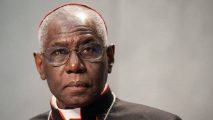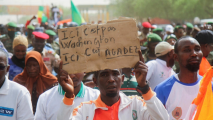Categories
Recent Posts
- Cameroon is broken: Who can fix it?
- Cameroonian beer and soft drinks exports soar by 73% and 46.6% in 2022
- Southern Cameroons Crisis: 2 teachers abducted in the North West
- World Bank says despite high potential, 75 vulnerable economies face ‘Historic Reversal’
- Cardinal Robert Sarah says Western prelates have lost their nerve
Archives
- April 2024
- March 2024
- February 2024
- January 2024
- December 2023
- November 2023
- October 2023
- September 2023
- August 2023
- July 2023
- June 2023
- May 2023
- April 2023
- March 2023
- February 2023
- January 2023
- December 2022
- November 2022
- October 2022
- September 2022
- August 2022
- July 2022
- June 2022
- May 2022
- April 2022
- March 2022
- February 2022
- January 2022
- December 2021
- November 2021
- October 2021
- September 2021
- August 2021
- July 2021
- June 2021
- May 2021
- April 2021
- March 2021
- February 2021
- January 2021
- December 2020
- November 2020
- October 2020
- September 2020
- August 2020
- July 2020
- June 2020
- May 2020
- April 2020
- March 2020
- February 2020
- January 2020
- December 2019
- November 2019
- October 2019
- September 2019
- August 2019
- July 2019
- June 2019
- May 2019
- April 2019
- March 2019
- February 2019
- January 2019
- December 2018
- November 2018
- October 2018
- September 2018
- August 2018
- July 2018
- June 2018
- May 2018
- April 2018
- March 2018
- February 2018
- January 2018
- December 2017
- November 2017
- October 2017
- September 2017
- August 2017
- July 2017
- June 2017
- May 2017
- April 2017
- March 2017
- February 2017
- January 2017
- December 2016
- November 2016
- October 2016
- September 2016
- August 2016
- July 2016
- June 2016
Featured
Most Commented Posts
 4 Anglophone detainees killed in Yaounde
4 Anglophone detainees killed in Yaounde
19 comments Chantal Biya says she will return to Cameroon if General Ivo Yenwo, Martin Belinga Eboutou and Ferdinand Ngoh Ngoh are sacked
Chantal Biya says she will return to Cameroon if General Ivo Yenwo, Martin Belinga Eboutou and Ferdinand Ngoh Ngoh are sacked
13 comments Anglophone Nationalism: Barrister Eyambe says “hidden plans are at work”
Anglophone Nationalism: Barrister Eyambe says “hidden plans are at work”
12 comments The Anglophone Problem – When Facts don’t Lie
The Anglophone Problem – When Facts don’t Lie
12 comments Largest wave of arrest by BIR in Bamenda
Largest wave of arrest by BIR in Bamenda
10 comments
Latest Tweets
Featured
-

Cameroon is broken: Who can fix it?
-

Cameroonian beer and soft drinks exports soar by 73% and 46.6% in 2022
-

Southern Cameroons Crisis: 2 teachers abducted in the North West
-

World Bank says despite high potential, 75 vulnerable economies face ‘Historic Reversal’
-

Cardinal Robert Sarah says Western prelates have lost their nerve
-

Iran launches drones at Israel in retaliatory attack
-

Thousands protest in Niger demanding immediate withdrawal of US troops
© Cameroon Concord News 2024





17, April 2018
Why Nigeria must end the suffering in English-speaking Cameroon 0
The recent unrest in the English-speaking region of Western Cameroon caught the attention of the world media as well as that of the UN, EU and other international agencies. It is threatening to become part of what Wole Soyinka famously termed “the open wound of a continent”. Cameroon is a low-income country with a population of 23.4 million people. It has a GDP of US$30 million and per capita income of US$1,217. It belongs to the Central African Economic Community, one of the weakest in the continent, alongside shambolic countries such as DRC, Central Africa and Chad.
I am often grateful to the ancestors that we were colonised by the British rather than by the French or Portuguese. While they were all bastards, the British were more enlightened bastards. They were more interested in stealing our natural resources while leaving us to our devices; the French, by contrast, were not content to steal our patrimony but also to rob us of our very humanity.
Cameroon was first colonised by the Germans, who ruled from 1884 to 1916. Their historic defeat in what Lenin termed the First Imperialist War forced them to hand-over their colony to the French and the British. The French took the lion-share in the East while the British had a third of the territory in the West. The approaches to colonial administration in both territories sowed the seeds of some of the problems of nationhood that have afflicted modern Cameroon.
The French ruled through the policies of direct rule and assimilation. They introduced a system of forced labour. They also gave preference to catholic missionaries who established schools and clinics. The colonial legal system was anchored on the civil law tradition which limits the prerogatives of judges to what is codified, with more investigative and prosecutorial powers given to the magistracy. Everything was geared to glorify France as the acme of human civilisation. Both the elites and the masses have remained the mental slaves of their French masters. By contrast, the British introduced the indirect rule system in their territory. Protestant missionaries predominated. They also built schools and clinics. British colonial law accorded respect and dignity to the Africans. Forced labour was abolished in preference for wage labour.
Many Africans sought colonial jobs in the plantations and colonial infrastructures as an opportunity for higher income and greater upward mobility. When Cameroon became nominally independent from France on 1st January 1960, a plebiscite was carried out to determine if the Westerners wanted to be in Nigeria or in Cameroon. The north opted to join Nigeria, thanks to the indefatigable campaigns waged by Sir Ahmadu Bello, late premier of the Northern Nigeria. The south, on the other hand, opted to rejoin Cameroon. My Cameroonian friends have told me that their parents recounted to them tales of humiliation and arrogance by the Igbo of Eastern Nigeria. They did not need to be persuaded to rejoin Cameroon. Following the plebiscite Cameroon under its first president Ahmadou Ahidjo adopted a federal constitution in 1972. The new constitutional arrangement accorded a special autonomous status to the English-speaking region. When Paul Biya succeeded Ahidjo in November 1982, he abolished the federal constitution and replaced it with a unitary system; centralising power and revoking the regional autonomy arrangement that the English-speaking region had enjoyed.
The current crisis in Cameroon should not be reduced to an “Anglophone-Francophone” problem. It is far deeper than that. It touches on the anatomy of dictatorship in a corrupt, rapacious, incompetent, extractive neo-colonial apparatus that has treated its citizens with such contumely. The grievances of the English-speaking Cameroonians centre on the fact that they have been deprived of opportunities for advancement while infrastructures and public goods are largely concentrated on the French-speaking East. The two largest cities in Cameroon are Yaoundé, the political capital, and Douala, the commercial capital, in the coast. The main national rail line links Douala and Yaoundé, while the seaports are in Douala, Kribi and Limbé. The bulk of administrative and economic power is thus concentrated on the French-speaking side. While Cameroon is constitutionally a bilingual country, the government has barely tolerated the use of English in preference for French in all matters of public administration.
I recently watched a news clip of English-speaking barristers demonstrating against imposition of French language in the courts. The westerners are gradually being reduced to the status of servitude as “drawers of water and hewers of wood”. I have visited Cameroon several times. I love the country and its people. On the surface, it appears to be a tranquil place. Beneath, there is a seething volcano. Ask the Bamileke who have been hounded and persecuted for decades — ask the intellectuals and professionals who have fled abroad in droves. It is, in reality, a wretched country under the stranglehold of Paul Biya and his French Masonic brethren who have ruled with an iron hand for 35 years.
We are told that the man lives mostly in Switzerland and hardly ever convenes cabinet meetings; an absentee-landlord whose misrule has crippled this great country and its wonderful people. Not too long ago he was alleged to have taken 43 rooms for himself and his entourage at the five-star L’Hérmittage Barrière resort at La Baule in southern France. It was rumoured to cost US$35,000 per night. Recently, English-speaking dissidents unilaterally declared an independent “Ambazonian Republic”. The state responded with such violence that the EU was compelled to plead with the authorities to apply only “proportionate force” as a rule of engagement.
The government also blocked internet accessibility for several months, crippling business and communications. More than 50,000 Cameroonian refugees are in our country. The federal government has been careful not to rock the boat. Cameroon under Ahidjo staunchly stood with the Gowon administration, refusing to aid secessionist Biafra. They helped us win the war. But there has also always been the sticky issue of Bakassi; an international complot to cede off a huge chunk of our coastal territory to sinister French oil and commercial interests. Cameroon, like many so-called “Francophone” countries, is a satellite of a Leviathan that calls itself France-Afrique. France controls their money, their economies, their banking system and their infrastructures and public administration.
When the Bakassi case came up for hearing at the international Court of Justice in The Hague, the fact that the presiding judge was a Frenchman meant we had lost the case ab initio. Under the Green Tree Agreement, the indigenes of Bakassi are supposed to be free to live and pursue their livelihoods as they have done since time immemorial. Alas, the regime in Yaoundé has observed the agreement more in the breach than anything else. The gendarmes have moved in, killing people, pillaging, capsizing boats and extorting humongous amounts for fishing rights. They have shown that it was never theirs in the first place. In a judgement that is unenforceable and whose terms have been violated, we have a duty to revisit it. Winston Churchill warned that borders are never negotiated – they are only defended. It would be rather premature to accord recognition to the soi-disant Republic of Ambazonia, but we should provide humanitarian succour to the people of west Cameroon. Enough is enough. Silence at this stage amounts to complicity in genocide.
We should engage with the regime in Yaoundé and compel them to restore the federal constitution and the autonomy that the westerners had enjoyed hitherto. We should also push for a consociational arrangement that ensures that western Cameroonians are represented at all echelons of leadership, government and the administration. Cameroon is a member of the Commonwealth of Nations. If the regime continues to violate the rights of its citizens in such a callous and flagrant manner, we must take steps to ensure that they are expelled from the Commonwealth.
Source: www.vanguardngr.com